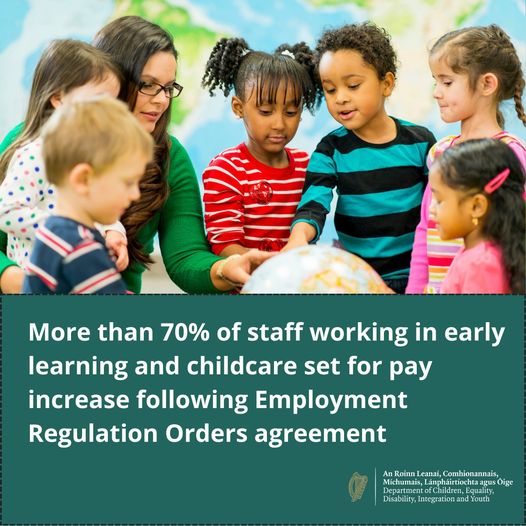DCEDIY Update on Employment Regulation Orders for the Early Years Services Sector
Damien English T.D., Minister of State for Business, Employment and Retail has today accepted proposals for Employment Regulation Orders for the Early Years Services Sector. The Orders will commence on 15 September 2022, providing new minimum hourly rates of pay for various roles in the Early Years Services Sector as follows:
• €13.00 for Early Years Educators/ School-Age Childcare practitioners;
• €14.00 for Early Years Lead Educators / School-Age Childcare co-ordinators;
• €15.50 Graduate Early Years Lead Educators / School-Age Childcare co-ordinators
• €15.70 for Deputy Managers;
• €16.50 for Managers; and
• €17.25 for Graduate Managers.
The Orders are being supported by Government’s €221m Core Funding Scheme, announced by Roderic O’Gorman, T.D., Minister for Children, Equality, Disability, Integration and Youth as part of Budget 2022, which will see increases in funding to early learning and childcare services to support improvements in staff wages, alongside a commitment to freeze parental fees. The commencement date for the Orders – 15 September – coincides with the official launch of Core Funding.
Minister O’Gorman has welcomed Minister English’s acceptance of the Early Years Services Employment Regulation Orders as they will deliver improved pay and conditions for the large majority of those working in the sector, will support career pathways, and will ensure improved minimum rates of pay for all those considering entering the Sector.
Minister O’Gorman said:
“I have always said that I believe early years educators and school-age childcare practitioners need their pay and conditions to reflect the importance of the work they do. Today’s announcement is an historic first step towards that”.
“Since I became Minister with responsibility for early learning and childcare, I have been focused on reducing costs for parents, improving sustainability for providers and importantly improving quality for children”.
“Yet low pay and conditions as well as limited opportunities for progression has made it difficult to attract and retain staff in the sector – and it is the staff who are key to the quality of children’s experiences”.
“Through these first Employment Regulation Orders for the sector, I hope that early years educators and school-age childcare practitioners can now see a real future for themselves in a job that gives so much to children, their families and to society more broadly”.
“I would like to acknowledge the independent nature of the Labour Court and Joint Labour Committee process and the hard work of its members in negotiating the pay and conditions for employees in the early learning and childcare sector”.
The Employment Regulation Orders apply to approximately 27,000 staff.
It is estimated that 73% of those working in the sector will see their wages rise as a result of the Employment Regulation Orders with the wages of 50% of employees in the sector expected to rise by 10% or more, and the wages of 20% of employees are expected to rise by 20% or more.

